比较级
- 格式:doc
- 大小:87.50 KB
- 文档页数:17


形容词的比较级大全形容词是我们日常生活中经常用到的词语,它们可以用来形容人、物、事物的特征或性质。
而形容词的比较级则是用来比较两个事物之间的差异,表示其中一方具有更高或更低的属性。
下面就为大家罗列一些常用形容词的比较级以及其相应的用法。
1. 比较级:big(大)- bigger(更大)用法:The elephant is bigger than the mouse.(象比老鼠更大。
)2. 比较级:small(小)- smaller(更小)用法:The ant is smaller than the beetle.(蚂蚁比甲虫更小。
)3. 比较级:tall(高)- taller(更高)用法:The giraffe is taller than the zebra.(长颈鹿比斑马更高。
)4. 比较级:short(短)- shorter(更短)用法:The pencil is shorter than the ruler.(铅笔比尺子更短。
)5. 比较级:long(长)- longer(更长)用法:The snake is longer than the worm.(蛇比虫子更长。
) 6. 比较级:fast(快)- faster(更快)用法:The cheetah is faster than the lion.(猎豹比狮子跑得更快。
)7. 比较级:slow(慢)- slower(更慢)用法:The turtle is slower than the rabbit.(乌龟比兔子跑得更慢。
)8. 比较级:easy(容易)- easier(更容易)用法:The multiple-choice test is easier than the essay test.(选择题比论述题更容易。
)9. 比较级:difficult(困难)- more difficult(更困难)用法:Calculus is more difficult than algebra.(微积分比代数更困难。

比较级、最高级比较级:一、形容词的比较级1、形容词比较级在句子中的运用:两个事物或人的比较用比较级,比较级后面一般带有单词than。
2、比较级的句子结构通常是:A+ 动词be (am , is , are ) + 形容词比较级+ than(比)+ B ,如:I'm taller and heavier than you. 我比你更高和更重。
An elephant is bigger than a tiger. 一只大象比一只老虎更大。
比较级前面可以用much, a little,a few 来修饰表示程度。
than后的人称代词用宾格。
二、形容词比较级的变化规则(一)规则变化A.①一般情况在原级的词尾加-er如tall - taller , strong - stronger②以e结尾的词,直接加-r ,如fine - finer ,large —larger③以―辅音字母加y结尾的词,先改y为i再加-er,如funny - funnier④重读闭音节,末尾只有一个元音字母和一个辅音字母的词,先双写这一辅音字母再加-er,如big--bigger, thin--thinner ,hot--hotter,sad--sadder,fat—fatterB. 多音节词和部分双音节词在词前加more例如:delicious - more delicious beautiful--more beautiful,expensive--more expensive interesting - more interesting (二)不规则形容词比较级good / well --better, bad / badly—worse,many / much—more,little—less far—farther/further三、形容词比较级的用法1.两者比较时用形容词比较级,其结构为“A+比较级+than+B例:She is taller than Lily.2.在两者之间选择“哪一个更……“时,用句型”which/who is+比较级…or…? 例:which sweater is cheaper ,the red one or the yellow one?3.表示“两者之间更……的一个”时,用“the+比较级”例:Lucy is the taller of the twins. Lucy 是双胞胎里更高的那个。
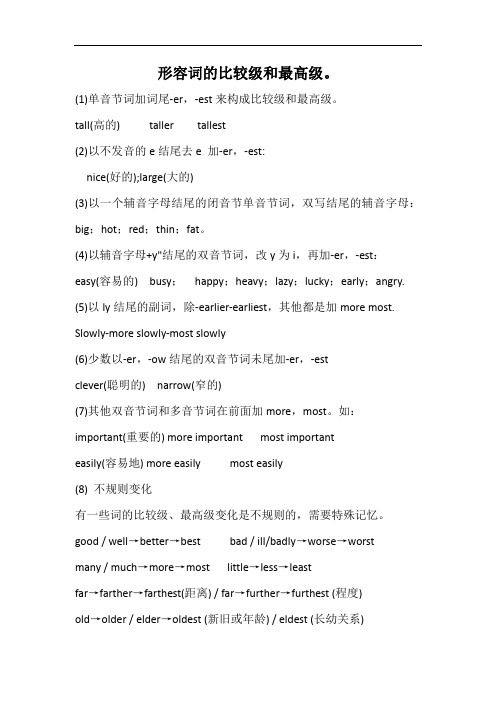
形容词的比较级和最高级。
(1)单音节词加词尾-er,-est来构成比较级和最高级。
tall(高的)taller tallest
(2)以不发音的e结尾去e 加-er,-est:
nice(好的);large(大的)
(3)以一个辅音字母结尾的闭音节单音节词,双写结尾的辅音字母:big;hot;red;thin;fat。
(4)以辅音字母+y"结尾的双音节词,改y为i,再加-er,-est:
easy(容易的)busy;happy;heavy;lazy;lucky;early;angry. (5)以ly结尾的副词,除-earlier-earliest,其他都是加more most. Slowly-more slowly-most slowly
(6)少数以-er,-ow结尾的双音节词未尾加-er,-est
clever(聪明的)narrow(窄的)
(7)其他双音节词和多音节词在前面加more,most。
如:important(重要的) more important most important
easily(容易地) more easily most easily
(8) 不规则变化
有一些词的比较级、最高级变化是不规则的,需要特殊记忆。
good / well→better→best bad / ill/badly→worse→worst
many / much→more→most little→less→least
far→farther→farthest(距离) / far→further→furthest (程度)
old→older / elder→oldest (新旧或年龄) / eldest (长幼关系)。

英语形容词比较等级有三个:原级,比较级和最高级。
形容词比较等级形式变化有规则的和不规则的两种。
规则变化1)单音节词末尾加-er(比较级),-est(最高级)【例】原级比较级最高级great greater greatestsmall smaller smallestclean cleaner cleanest2)单音节如以e结尾,只加-r(比较级),-st(最高级)【例】fine finer finestnice nicer nicestwide wider widest3)闭音节单音节词如末尾只有一个辅音字母,须先双写这个辅音字母,再加-er(比较级),-est(最高级)【例】big bigger biggesthot hotter hottestred redder reddest 4)少数以-y,-er,ow,-ble结尾的双音节词,末尾加-er(比较级),-est (最高级)。
以-y结尾的词,如-y前是辅音字母,则变y为-i,再加-er和-est。
以-e结尾的词只加-r和-st。
【例】clever cleverer cleverestnarrow narrower narrowestable abler ablesteasy easier easiest5)其它双音节和多音节词皆在前面加单词more和most。
【例】careful more careful most carefuldifficult more difficult most difficultdelicious more delicious most delicious不规则变化原级比较级最高级good/well better bestbad worse worstmany/much more mostlittle less leastfar farther/further farthest/furthest。

比较级,比较级的用法比较级是英语中用来比较两个事物、人物或概念之间差异和相似之处的一种语法形式。
通过使用比较级,我们可以描述出某个事物相对于其他事物在某个方面上的高低、多少或程度等信息。
在本文中,我们将详细探讨比较级的用法以及一些常见的结构和例句。
一、基本用法1. 比较级用来比较两个人或事物之间的性质、特征或状态。
例如:- She is taller than her brother.(她比她兄弟高。
)- This book is more interesting than the one I read yesterday.(这本书比我昨天看的那本有趣。
)2. 比较级通常由形容词与 "-er" 后缀组成,习惯上也可由副词加 "more" 构成。
例如:- The car is faster than the bicycle.(汽车比自行车快。
)- He spoke more confidently in front of a large audience.(他在大庭广众之前更自信地讲话。
)3. 在使用形容词时,需要注意音节数变化和规则变化。
- 单音节形容词:直接在后面加 "-er" 形成比较级。
例如:big - bigger(大 - 更大),tall - taller(高 - 更高)- 双音节形容词:在前面加 "more" 形成比较级。
例如:modern - more modern(现代 - 更现代),simple - more simple(简单 - 更简单)- 部分双音节形容词和多音节词也可以使用 "-er" 形式。
例如:clever - cleverer 或 clever(聪明的 - 更聪明的),gentle - gentler 或gentle(温和的 - 更温和的)二、特殊用法1. 某些形容词及副词应用不规则变化形式。
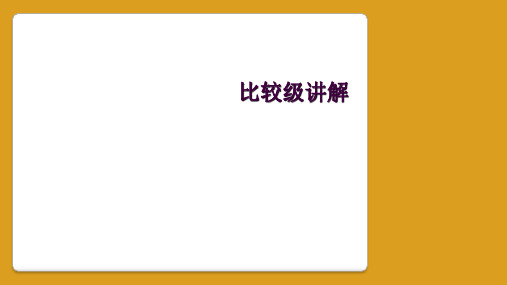
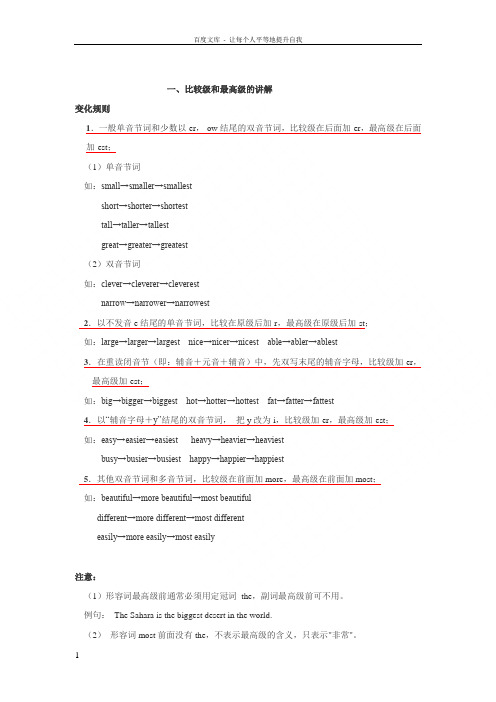
一、比较级和最高级的讲解变化规则1.一般单音节词和少数以-er,-ow结尾的双音节词,比较级在后面加-er,最高级在后面加-est;(1)单音节词如:small→smaller→smallestshort→shorter→shortesttall→taller→tallestgreat→greater→greatest(2)双音节词如:clever→cleverer→cleverestnarrow→narrower→narrowest2.以不发音e结尾的单音节词,比较在原级后加-r,最高级在原级后加-st;如:large→larger→largest nice→nicer→nicest able→abler→ablest3.在重读闭音节(即:辅音+元音+辅音)中,先双写末尾的辅音字母,比较级加-er,最高级加-est;如:big→bigger→biggest hot→hotter→hottest fat→fatter→fattest4.以“辅音字母+y”结尾的双音节词,把y改为i,比较级加-er,最高级加-est;如:easy→easier→easiest heavy→heavier→heaviestbusy→busier→busiest happy→happier→happiest5.其他双音节词和多音节词,比较级在前面加more,最高级在前面加most;如:beautiful→more beautiful→most beautifuldifferent→more different→most differenteasily→more easily→most easily注意:(1)形容词最高级前通常必须用定冠词the,副词最高级前可不用。
例句:The Sahara is the biggest desert in the world.(2)形容词most前面没有the,不表示最高级的含义,只表示"非常"。

比较级比较级(Comparative Degree)就是将二者进行比较产生的词形,是由形容词原级转化而来的,一般是在原级后面加er,也有一些不规则的转化,比如good —better,bad—worse,有很多。
相对二者的比较,还有三者及以上的比较,这时就产生了最高级。
在英语中通常用下列方式表示的词:在形容词或副词前加more(如 more natural,more clearly )或加后缀-er(newer,sooner )。
典型的是指形容词或副词所表示的质、量或关系的增加。
英语句子中,将比较两个主体的方法叫做“比较句型”。
其中,像“A比B更……”的表达方式称为比较级。
组成句子的方式是将形容词或副词变化成比较级的形态。
构成.单音节形容词和部分双音节词,一般在词尾加-er。
..以字母e结尾的词,在词尾直接加-r。
..重读闭音节词词尾只有一个辅音字母,元音发短音时,双写尾字母,再加er。
..以"辅音字母+y“结尾的双音节词,变”y“为”i“,再加-er。
..多音节词和部分双音节词,在词前加”more“。
..部分形容词和副词的比较级是不规则的,如:good/well-better,bad/badly-worse。
..由“动词+后缀-ing/-ed”构成的形容词,在词前加more构成比较级。
如:interesting-more interesting,bored-more bored。
..由“形容词+后缀-ly”构成的副词,在该副词前加more构成比较级。
如:slowly-more slowly,happily- more happily。
.用法一般1. 表示"比...更"。
用比较级形容词+than+比较成分, than后主词的述语动词往往省略, 非正式用法的than后的人称代名词可用宾格。
He is younger than me.他比我年轻。
I am a better swimmer than he(him).我游泳比他好。


(一 )比较级和最高级的构成:1 加-er,-est 构成比较级和最高级。
【1】单音节形容词和副词high-higher-highest hard-harder-hardest 【2】以不发音的 -e 结尾的safe-safer-safest late-later-latest【3】辅音字母要双写的情况:【4】以辅音加 -y 结尾的情况dry-drier-driest merry-merrier-merrist 2 加 more,most 构成比较级和最高级。
【1】多音节的形容词和副词expensive-more expensive-most expensivecarefully-more carefully-most carefully【2】由形容词加 -ly 构成的副词slowly-more slowly-most slowlyhighly-more highly-most highly【3】以-ful,-less,-able,-ous,-ive,-ing 等结尾的双音节形容词useless-more useless-most uselessserious-more serious-most seriuos【4】分词形容词 tired,pleased 及 glad,often,real,right,wrong 等单音节形容词tired-more tired-most tiredglad-more glad-most glad( 3 )形容词、副词的比较级和最高级的不规则构成法。
bad/ill/badly-worse-worstmany/much-more-mostlittle-less-leastfar-farther/further-farthest/furthestold-older/elder-oldest/eldest(二) 比较级和最高级的用法1 比较级的表示法:主语 +be +比较级+than …;主语+谓语+比较级+than …( 1 )不同主语的比较:He is two years younger than I.This machine works better than that one.Li Ming studies harder than Wang Ling.( 2 )同一主语不同方面的比较:She is now happier than she has ever been.The exam was easier than we expected.We have had much more rain this year than last year.( 3 )用于修饰比较级的词: even,(very) much,far,a lot,stillThis book is much thicker than that one.He works even harder than before.( 1 ) 形容词和副词最高级的用法三者或三者以上的比较用最高级。

一、形容词的比较级1、形容词比较级在句子中的运用:两个事物或人的比较用比较级,比较级后面一般带有单词than。
比较级前面可以用more, a little 来修饰表示程度。
than后的人称代词用主格(口语中可用宾格)。
2.形容词变比较级的规则:⑴一般在词尾加er。
如tall-taller.⑵以字母e 结尾,加r 如large-larger nice-nicer⑶以“辅音+元音+辅音”字母结尾的,应双写末尾的辅音字母,再加er 如:big-bigger hot-hotter thin -thinner⑷以“辅音字母+y”结尾,先把y变i,再加er 如heavy-heavier easy-easier happy-happier3.多音节的形容词,在前面加more。
如:beautiful-more beautiful expensive- more expensive interesting- more interesting4.不规则形容词比较级:good好-better更好, much/many多-more更多little/few(少)-less更少bad/ill坏- worse更坏二、副词的比较级形容词比较级的用法:1.看到句子里有than ,much,even 等用比较级。
如:I am taller than you.2.有两者比较时用比较级.Mike is young, but Tom is younger.1.副词比较级的变化规则基本与形容词比较级相同 (不规则变化:well-better, far远-further/farther更远)2.形容词与副词的区别 (形容词修饰名词,副词修饰动词,记住有be就用形容词,有形容词也就用be;有动词就用副,有副词用动动。
)⑴在句子中形容词一般处于名词之前或be动词之后⑵副词在句子中最常见的是处于实义动词之后三、练习一、写出下列形容词或副词的比较级old________ young________ tall_______ long________short________ strong________ big________ small________fat_________ thin________ heavy________ light________nice________ good________ beautiful_________low_________ high________ slow________ fast________late_________ early________ far________ well________二、根据句意填入单词的正确形式:1. My brother is two years __________(old)than me.2. Tom is as ________(fat) as Jim. ( as…as 与。

比较级知识点归纳比较级是英语语法中一个重要的知识点,用于表示两个或多个事物在某个方面进行比较。
比较级的形式是在形容词或副词前加上-er,或在前面加上more,表示“更……”。
在本篇文章中,将详细讨论比较级的用法和使用场景。
一、形容词的比较级用法:1. 单音节形容词:单音节形容词通常直接加-er,例如:- My sister is taller than me.(我的妹妹比我高。
)- This book is cheaper than that one.(这本书比那本便宜。
)2. 双音节形容词:双音节形容词前加more,例如:- She is more beautiful than her sister.(她比她妹妹更漂亮。
)- This movie is more interesting than the previous one.(这部电影比之前的更有趣。
)3. 特殊形容词:有些形容词的比较级形式是不规则的:- good - better(好 - 更好)- bad - worse(坏 - 更糟)- far - farther(远 - 更远)二、副词的比较级用法:1. 单音节副词:单音节副词通常直接加-er,例如:- He runs faster than me.(他跑得比我快。
)- She sings louder than her friend.(她唱得比她朋友大声。
)2. 双音节副词和部分单音节副词:双音节副词和部分单音节副词前加more,例如:- He speaks more fluently than his classmates.(他说得比他的同学更流利。
)- She studies more diligently than before.(她比以前更用功学习。
)三、比较级的用法:1. 比较两者之间的差异:- The weather today is hotter than yesterday.(今天的天气比昨天热。
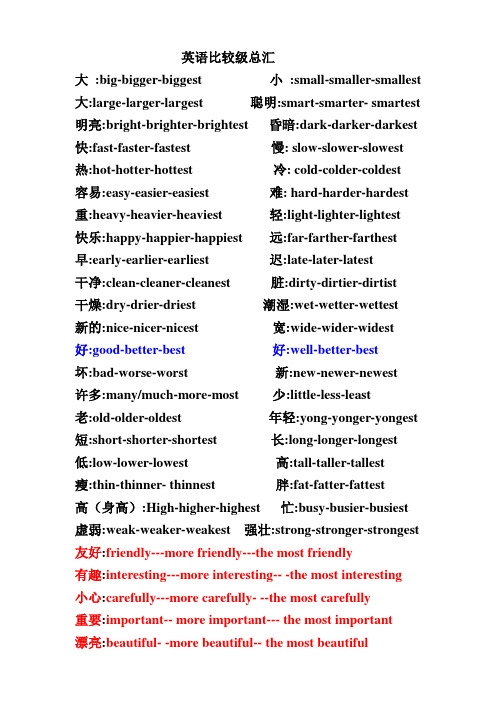
英语比较级总汇大:big-bigger-biggest 小:small-smaller-smallest 大:large-larger-largest 聪明:smart-smarter- smartest 明亮:bright-brighter-brightest 昏暗:dark-darker-darkest 快:fast-faster-fastest 慢: slow-slower-slowest 热:hot-hotter-hottest 冷: cold-colder-coldest容易:easy-easier-easiest 难: hard-harder-hardest 重:heavy-heavier-heaviest 轻:light-lighter-lightest快乐:happy-happier-happiest 远:far-farther-farthest 早:early-earlier-earliest 迟:late-later-latest干净:clean-cleaner-cleanest 脏:dirty-dirtier-dirtist干燥:dry-drier-driest 潮湿:wet-wetter-wettest新的:nice-nicer-nicest 宽:wide-wider-widest 好:good-better-best 好:well-better-best坏:bad-worse-worst 新:new-newer-newest许多:many/much-more-most 少:little-less-least老:old-older-oldest 年轻:yong-yonger-yongest 短:short-shorter-shortest 长:long-longer-longest 低:low-lower-lowest 高:tall-taller-tallest瘦:thin-thinner- thinnest 胖:fat-fatter-fattest高(身高):High-higher-highest 忙:busy-busier-busiest 虚弱:weak-weaker-weakest 强壮:strong-stronger-strongest 友好:friendly---more friendly---the most friendly有趣:interesting---more interesting-- -the most interesting小心:carefully---more carefully- --the most carefully重要:important-- more important--- the most important漂亮:beautiful- -more beautiful-- the most beautiful。

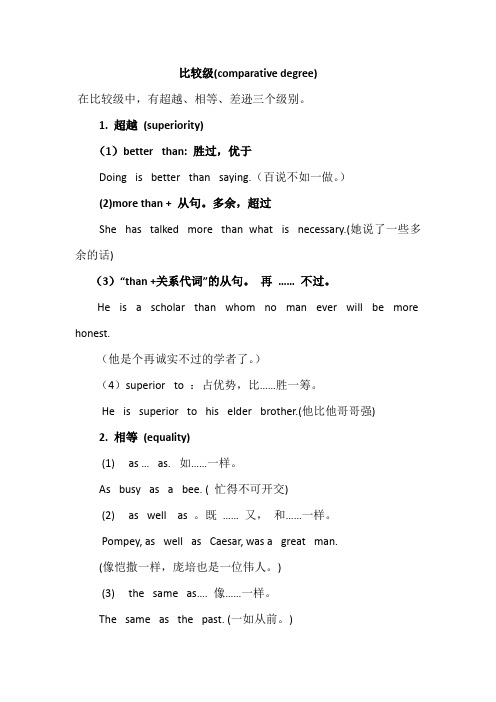
比较级(comparative degree)在比较级中,有超越、相等、差逊三个级别。
1. 超越(superiority)(1)better than: 胜过,优于Doing is better than saying.(百说不如一做。
)(2)more than + 从句。
多余,超过She has talked more than what is necessary.(她说了一些多余的话)(3)“than +关系代词”的从句。
再…… 不过。
He is a scholar than whom no man ever will be more honest.(他是个再诚实不过的学者了。
)(4)superior to :占优势,比……胜一筹。
He is superior to his elder brother.(他比他哥哥强)2. 相等(equality)(1) as …as. 如……一样。
As busy as a bee. ( 忙得不可开交)(2) as well as 。
既…… 又,和……一样。
Pompey, as well as Caesar, was a great man.(像恺撒一样,庞培也是一位伟人。
)(3) the same as…. 像……一样。
The same as the past. (一如从前。
)(4) such/ so…as. 像……一样。
Such a great poet as Homer was proficient not just in literature but also in history .(像荷马那样的诗人,不仅要精通文学,还要精通历史。
)(5) no sooner than.. 一……就(几乎同时,夸张用法)。
No sooner said than done.(说到做到。
)(6) No more than. 就像,不优于。
You’re no more capable of speaking French than I am.(你我都不会说日语。

形容词比较级与最高级一.比较级当我们需要对事物做出比较时,需用到比较级。
1.比较级的标志词:than,or,of the two2.比较级的结构:主语+动词be(am/is/are)+形容词比较级+than(比)+其他如:I am taller than you.我比你高。
He is the taller of the two.他是两个中最高的。
Which one do you like better,apple or orange.苹果和橙子你更喜欢哪一个?二.比较级的变化规则形容词的比较级是在形容词的基础上变来的,它的变化规则是:1.一般的直接在词尾加er. 如:tall---taller long---longer2.以e结尾的直接加r. 如:nice----nicer3.以辅音字母加y结尾的,直接把y改为i再加er. 如:happy---happier heavy—heavier4.以重读闭音节结尾的,双写末尾的辅音字母再加er. 如:big---bigger,hot—hotter,thin—thinner除此之外,还有几个词的比较级是不规则变化的,如:many/much(原形)-----more(比较级)------most(最高级)little/few(原形)-------less(比较级)------- least(最高级)good/well(原形)-----better(比较级)------best(最高级)bad(原形)----worse(比较级)-------worst(最高级)far(原形)----farther/further(比较级)-----farthest/furthest(最高级)old(原形)----older/elder(比较级)-----oldest/eldest(最高级)【注】形容词最高级的变化类似于比较级,只是把词尾的er改为est.而且特别要注意的是形容词最高级前面必须要加定冠词the.如:tall(原形)----taller(比较级)------the tallest(最高级)long(原形)-----longer(比较级)-----the longest(最高级)注意:比较的两者应该是互相对应的可比较的东西。
一、形容词级的构成1. 单音节形容词的比较级以及以-ly, -er, -ow结尾的形容词在词尾加-er;以e结尾的形容词在词尾直接加-r构成,重读闭音节双写末位字母再加er。
dark→darker; quick→quicker; ; clever→cleverer; simple→simpler; narrow→narrower。
2. 多音节形容词的比较级在其前加more构成。
important→more important; beautiful→more beautiful。
3. 表语形容词以及由分词变来的形容词,在其前加more构成。
afraid →more afraid; interesting→more interesting; pleased→more pleased。
4. 少数形容词的比较级是不规则的。
go od/well→better; bad/ill→worse; far→farther(表距离) / further(表抽象);much/many→more;little→less;old→older、elder.5.以辅音加y结尾的,把y变i,加er。
early→earlier;funny→funnier;easy→easier.原级比较1. 由“...as + 形容词 + as...”或“...as + 形容词 + 名词 + as...”构成。
My grandpa is as energetic as a young man.Exercise is as useful a way as any other to lose unwanted weight.I try to find as much information as I can about what happened.2. 由“...not so (as) + 形容词 + as...”或“...not so (as) + 形容词 + 名词 + as...”构成。
Luckily the weather was not so wet as it is today.不同级比较1. 由“……形容词比较级 + than...”构成。
He is more concerned about others than about himself.2. 由“...many / much more + 可数 / 不可数名词 + than...”My friend earned much more money than I did last year 特殊句型1.表示“越来越……”的意思: “比较级 + and + 比较级”或“more and more / less and less + 原级”结构,与这类结构搭配的常用动词有grow, get, become等。
She felt herself becoming more and more nervous.As the winter is drawing near, it's getting colder and colder.2.表示两者之间更···the + 比较级 + of the two + 名词。
Jane is the taller of the two children in our family.3. 表示“越……,越……”:“the + 比较级……,the + 比较级……”,The more magazines you sell, the more money you will get.4. “否定 + 比较级” 相当于最高级。
— Wait until we get a satisfactory reply, will you?— I couldn't agree more. The idea sounds great to me.5. “a + 比较级 + 名词(than...)” 结构常出现在以never构成的完成时态的动词后面。
How beautifully she sings!I have never heard a better voice.6. 倍数表示法:...times as + 形容词原级 + as...;...times + 形容词比较级 + than...;...times the + 性质名词 + of...。
The dining hall is three times as large as that one.The dining hall is three times larger than that one.The dining hall is three times the size of that one.注意事项1. 为了避免重复, 常用the one代替单数可数名词, the ones, those 代替复数名词, that 代替单数或不可数名词。
2. 当比较对象属于同一范围时,需使用other来排除自身,否则会造成与自身相比较的矛盾。
Canada is larger than any other country in North America.3. “no + 形容词的比较级+ than”结构表达对两者均否定。
Don't be proud so early. You are no better than me.4. 比较级前面可以用even, still, yet , any, much, a little, a lot, by far等修饰语用以加强语气或表示比较程度。
To tell you the truth, my boyfriend is much older than me.根据句中的关键词答题1. The new group of students is better-behaved than the other group who stayed here ______.A. earlyB. earlierC. earliestD. the earliest【解析】答案选B。
做此题的关键词是new,即把“新来的学生”与“早些时候呆在这儿的学生”进行比较。
全句意为:新来的这群学生比早些时候呆在这儿的那些学生表现得更好些。
2. —Do you need any help, Lucy?—Yes, the job is ______ I could do myself.A. less thanB. more thanC. no more thanD. not more than【解析】答案选B。
做此题要抓的关键词是yes,由于答话者对问话者的“你需要帮助吗?”作了肯定回答,说明答话者独自完成工作有困难,故填more than。
3. Of the two coats, I’d choose the ______ one to spare some money for a book.A. cheapestB. cheaperC. more expensiveD. most expensive【解析】答案选B。
关键词是句中的two,因是两者比较,故用比较级,可将答案锁定在B和C之间;再根据句意,排除C。
通过分析的隐含意思答题1. There is an old proverb, “Love me, love my dog. ” But there is ______ wisdom in this: “Love me, love my book.”A. someB. muchC. moreD. most【解析】答案选C。
这道题出得非常巧妙,句中既没有显示比较级的关键词,也没有暗示用比较级的than。
而是将“Love me, love my dog”与“Love me, love my book”两句进行比较,要求考生根据这两句话的内容确定哪句话更有wisdom。
2. With April 18’s railway speedup, highway and air transport will have to compete with ______ service for passengers.A. goodB. betterC. bestD. the best【解析】答案选B。
句子大意为:由于铁路提速了,所以高速公路和航空业要提高服务质量来竞争客源。
因将“高速公路和航空”与“铁路”比较,故用比较级。
3. The melon the Smiths served at dinner would have tasted ______ if it had been put in the fridge for a little while.A. goodB. betterC. bestD. well【解析】B。
题目中将“放入冰箱中冷冻”与“不放入冰箱中冷冻”作比较,故用比较级。
句意为:史密斯家人晚餐时上的甜瓜若能放入冰箱中冷冻一下味道会更好些。
4. Speaking of all the songs he has written, I think this is probably his ______ one.A. better-knownB. well-knownC. best-knownD. most-known【解析】C。
因为是从他所写的所有歌中选出一首来比较,故用最高级。
根据相关的修饰关系答题1. After two years’ research, we now have a ______ better understanding of the disease.A. veryB. farC. fairlyD. quite【解析】B。
这四个副词中,通常只有far可用于修饰比较。
注:quite有时也可用于修饰比较better,但它只用于表示“身体康复”,不用于其他意义。
2. Work gets done ______ when people do it together, and the rewards are higher too.A. easilyB. very easyC. more easilyD. easier【解析】C。
根据题意可知,说话者是将when people do it together 和when people don’t do it togethe r 这两种情况比较,故选比较级。
注意不要选D,因为在此题是要用副词修饰动词,不能用形容词。
另外,根据句末的higher too 也可知道此题是考查比较级。
编辑本段重要考点一、考查比较等级的基本用法1. Of the two sisters, Betty is _________ one, and she is also the one who loves to be quiet. (安徽卷)A. a youngerB. a youngestC. the youngerD. the youngest【解析】答案选C。